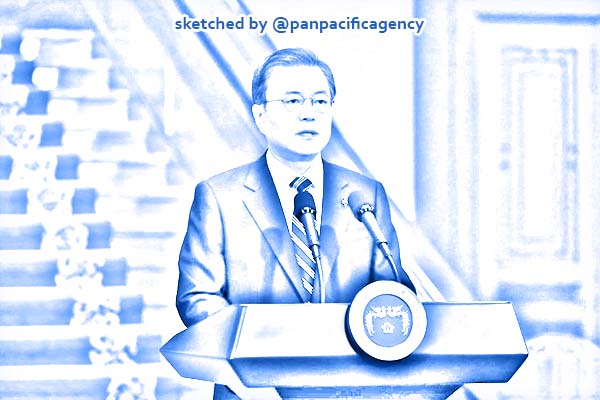[Analytics] Democracy should feature in South Korean development assistance

South Korean President Moon Jae-in gives his New Year’s address at the Blue House on Jan. 7. (Yonhap News). Sketched by the Pan Pacific Agency.
South Korea has been praised for its successful COVID-19 containment strategy, which has managed to keep deaths significantly below the global average. In April 2020, the country also held parliamentary elections amid the pandemic which attracted the highest voter turnout in 28 years. This was a testament to South Korea’s democratic development, confirming that it has become a mature democracy, capable of successfully operating even under abnormal circumstances. Simon Bruns specially for the East Asia Forum.
South Korea also highlights that democratic institutions and the democratic use of technology, backed by public trust, are an asset in containing COVID-19. This stands in contrast to most examples of successful containment strategies which come from authoritarian governments.
Despite this success, South Korean democracy is usually a footnote in discussions about the third wave of democratisation. South Korea’s rapid economic development is globally admired and it sees this experience as an asset that it can share with the world. This is reflected in its current official development assistance (ODA) policy, which emphasises a technocratic approach to development based on infrastructure expansion and the strengthening of foreign trade. The implication is that all that is needed for economic growth are strong and capable institutions, but not necessarily democratic ones.
This mirrors South Korea’s own historical experience, where democratisation initially followed, rather than accompanied, its economic development. South Korea’s approach to ODA policy is born out of and linked to an authoritarian development state. In this sense, it reaffirms China’s authoritarian approach to development and that democracy is neither needed for development nor worthy of aspiration.
South Korea should be sharing its practical democratic experience by focussing on the elements of its political liberalisation that allowed it to democratise. It needs to recognise that its democratic experience is unique and worth sharing with other countries.
The structure of South Korea’s ODA program needs to be revised to demonstrate the country’s experience with democracy and development. Within the dual structure of South Korean ODA disbursement, the Korean International Cooperation Agency (KOICA) would be best placed to undertake such a process.
Still, two problems with KOICA need to be addressed.
First, KOICA is overstretched in terms of its budget, personnel and project sectors. Democracy does not feature as a project sector and even if it were to feature it would be ineffective given current conditions. Second, KOICA’s close relationship with the chaebol (conglomerates), which have started to play a large role in designing and implementing aid policy, is an issue. This, along with an increasing preference for public–private partnerships, is a product of South Korea’s own economic structures but is also symptomatic of a global trend toward ODA privatisation.
South Korea should incorporate its unique democratic assets into its ODA program. One asset is the high degree of popular and civil society involvement in its political process. The country’s colonial history and its recent development experience also allow it to brand any type of ODA as genuine south–south cooperation. This places South Korea in a strong position to engage in democratic capacity building.
This policy would reap substantial benefits for South Korea. First, it would solidify South Korea as a middle power, by placing it in a stronger position to shape global norms and allow it to present itself to developing countries as an alternative to the United States and China. Second, it could serve as an avenue for closer East Asian cooperation based on common political systems. It could work as a trust building exercise from which to improve Japan–South Korea relations, echoing earlier proposals for a ‘democratic security diamond’ between like-minded Indo-Pacific countries.
Yet the reality is that geopolitical and economic interests often take precedence in ODA policy. South Korea is no exception, with the majority of its partner countries being those identified under President Moon Jae-in’s New Southern Policy (NSP). Indeed, the level of democratic development across NSP partners varies.
KOICA should focus on involving South Korean civil society organisations (CSOs) more in the monitoring of aid projects. This would lend more credibility to aid projects, as the involvement of CSOs highlights the donor’s trust in the effectiveness of their own democratic system. Although CSOs have been more involved in monitoring projects, notably through frameworks such as Development Alliance Korea, there is room for expansion.
South Korea should target and prioritise countries where there is demand for ODA with a democratic capacity building component. This strengthens the agency of recipient countries and ensures South Korea is not ostensibly forcing its political system on others. South Korea should be more selective in its aid policy to incentivise democratisation. It should limit the amount of aid that non-democratic countries receive and upgrade partnerships with democratic countries.
South Korea stands in a unique position to benefit from the stronger promotion of democracy in its ODA. It has the potential to do this in a way that is agreeable to developing countries by granting them agency and assuring them of their sovereignty.
Simon Bruns is the Presidential Intern for the Accreditation Steering Committee, Al Akhawayn University, Morocco.